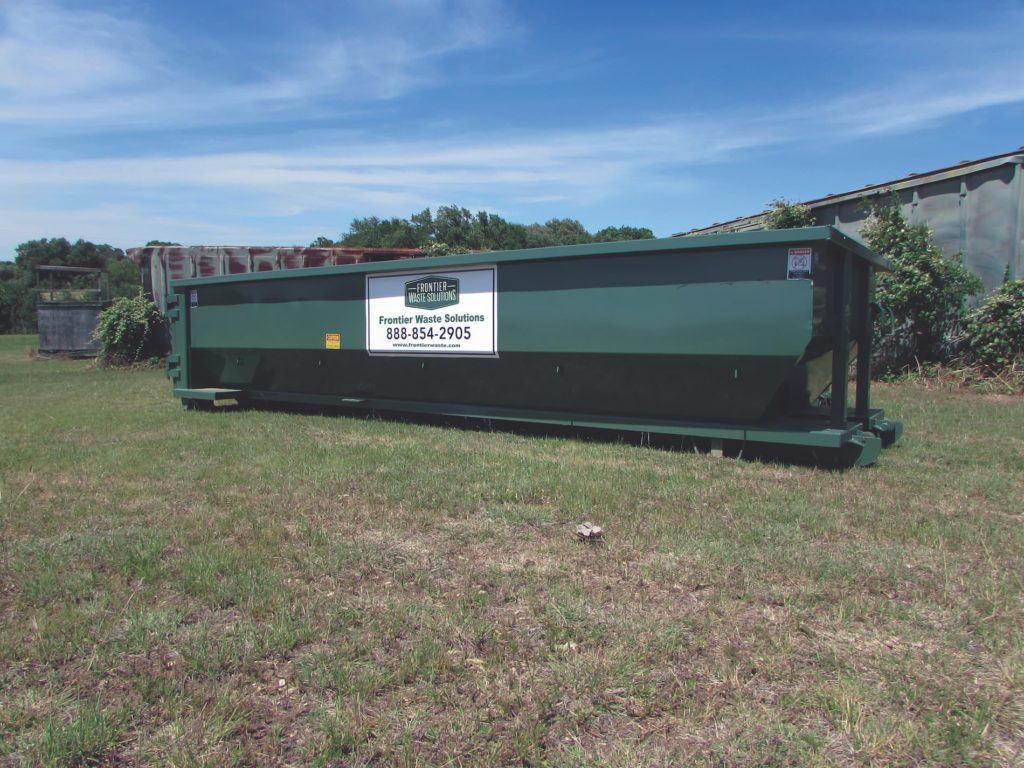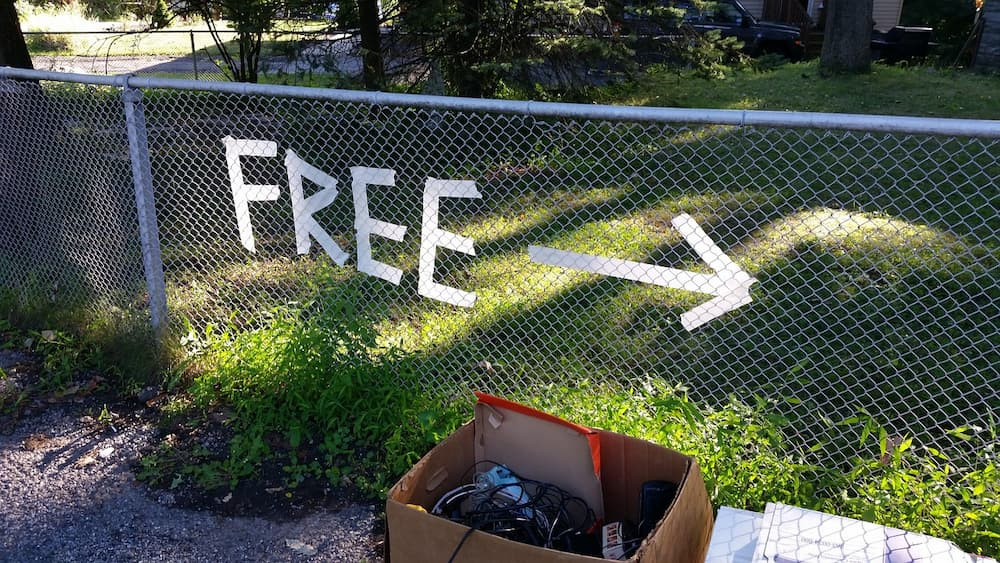Are you wondering Where Can I Get Rid Of Rocks cluttering your yard after a landscaping project? Rockscapes.net offers expert advice and solutions for responsible rock disposal, ensuring your property remains beautiful and environmentally sound. We’ll explore various options, from dumpster rentals to creative reuse, helping you find the perfect solution for your needs and budget. Discover sustainable disposal methods, repurposing ideas, and local resources to transform your leftover stones into valuable assets, emphasizing proper rock management, stone removal, and ecological disposal practices.
1. Understanding Your Rock Disposal Options
Knowing where can I get rid of rocks involves understanding the range of disposal methods available. Each option has its pros and cons, depending on the quantity of rocks, your budget, and your environmental concerns. Let’s explore the most common methods:
-
Roll-Off Dumpster Rental: Renting a roll-off dumpster is an efficient solution for large quantities of rocks and other debris. Companies like Frontier Waste Solutions deliver a dumpster to your property and pick it up when you’re done.
-
Classified Ads and Online Marketplaces: Websites like Freecycle, Craigslist, and Nextdoor can connect you with individuals or landscaping companies that may need rocks for their projects.
-
DIY Disposal: You can haul the rocks yourself to a local landfill or dump. This option requires a suitable vehicle and may involve disposal fees.
-
Junk Removal Services: Junk removal companies handle the entire process, from loading the rocks to hauling them away for disposal or recycling.
-
Giving Away Rocks: Placing a “free rocks” sign can attract passersby who may be interested in taking them off your hands.
1.1. Roll-Off Dumpster Rental: A Comprehensive Solution
Renting a roll-off dumpster is a convenient and efficient way to get rid of a large volume of rocks. This is particularly useful if you’re undertaking a major landscaping project or renovating your yard. Several companies offer dumpster rental services tailored to yard waste and construction debris.
- Convenience: The dumpster is delivered to your location, allowing you to load the rocks at your own pace.
- Versatility: Suitable for disposing of various materials, including rocks, soil, and other landscaping waste.
- Proper Disposal: Reputable companies ensure that the rocks are disposed of in an environmentally responsible manner.
To optimize this process, consider these tips:
- Weight Limits: Be aware of the weight limits to avoid additional charges.
- Dumpster Size: Choose the appropriate dumpster size based on the volume of rocks.
- Rental Terms: Understand the rental terms, including the duration and any restrictions on materials.
According to Frontier Waste Solutions, their yard waste dumpsters range from 20-yard to 40-yard options, with the 20-yard dumpster being suitable for disposing of rocks under the weight limit.
 Roll-off dumpster rental for rock disposal
Roll-off dumpster rental for rock disposal
1.2. Leveraging Online Marketplaces and Classifieds
Online marketplaces and classified ads can be a great way to find someone who needs your rocks. Websites like Craigslist, Freecycle, and Nextdoor connect people within your community, making it easier to find a new home for your unwanted rocks.
- Cost-Effective: You can often give away the rocks for free, saving on disposal costs.
- Environmentally Friendly: Reduces waste by repurposing the rocks for other projects.
- Community Engagement: Connects you with local individuals or organizations that can benefit from the rocks.
Tips for successful listing:
- Detailed Description: Provide a clear description of the rocks, including their size, type, and quantity.
- High-Quality Photos: Include clear photos of the rocks to attract potential takers.
- Contact Information: Make it easy for interested parties to contact you.
1.3. DIY Rock Disposal: A Hands-On Approach
If you have a suitable vehicle and the physical capacity, you can haul the rocks yourself to a local landfill or dump. This option requires some effort but can be cost-effective for smaller quantities of rocks.
- Cost Savings: You avoid dumpster rental or junk removal fees.
- Flexibility: You can dispose of the rocks at your own pace and schedule.
- Direct Control: You have direct control over the disposal process.
Considerations for DIY disposal:
- Vehicle Suitability: Ensure your vehicle is capable of hauling the weight and volume of rocks.
- Disposal Fees: Check with the landfill or dump about any restrictions or fees.
- Physical Effort: Be prepared for the physical labor involved in loading and unloading the rocks.
 DIY rock disposal using a truck
DIY rock disposal using a truck
1.4. Junk Removal Services: A Hassle-Free Option
Hiring a junk removal company is a convenient option if you don’t want to deal with the physical labor or logistics of rock disposal. These companies will come to your property, load up the rocks, and haul them away for proper disposal or recycling.
- Convenience: The company handles all the heavy lifting and disposal logistics.
- Time-Saving: Frees up your time for other tasks.
- Proper Disposal: Reputable companies ensure that the rocks are disposed of responsibly.
Factors to consider:
- Cost: Service fees vary depending on the volume of rocks and your location.
- Reputation: Choose a reputable company with positive reviews and a commitment to responsible disposal.
- Recycling Practices: Inquire about the company’s recycling practices to ensure your rocks are repurposed whenever possible.
1.5. Giving Away Rocks: A Community-Oriented Approach
If you have a small quantity of rocks, consider giving them away to neighbors or community members who may need them for landscaping projects. This can be as simple as placing a “free rocks” sign by the side of the road or posting an ad on local community boards.
- Cost-Free: You avoid disposal fees and potentially make someone’s day.
- Community Engagement: Connects you with neighbors and promotes resource sharing.
- Environmentally Friendly: Reduces waste by repurposing the rocks for other uses.
 Free rocks offered to the community
Free rocks offered to the community
2. Rock Disposal Cost Comparison
The cost of disposing of rocks varies widely depending on the method you choose and the quantity of rocks you have. Here’s a cost comparison to help you make an informed decision:
| Disposal Method | Cost | Pros | Cons |
|---|---|---|---|
| Roll-Off Dumpster Rental | $329 – $825 (average $525) | Convenient, suitable for large quantities, proper disposal guaranteed | Can be expensive for small amounts, requires loading yourself |
| Online Marketplaces | Free | Cost-effective, environmentally friendly, community engagement | Requires effort to find someone, may not be suitable for bulk amounts |
| DIY Disposal | $32 – $50 per ton at landfill | Cost savings, flexibility, direct control | Physically demanding, requires a suitable vehicle, disposal fees apply |
| Junk Removal Services | $275 – $600 per trip (up to 2 tons) | Convenient, heavy lifting done for you, proper disposal guaranteed | Expensive for large quantities, price subject to change after evaluation |
| Giving Away Rocks | Free | Cost-free, community engagement, environmentally friendly | No guarantee someone will take them, not suitable for bulk disposal |
2.1. Dumpster Rental Cost Factors
When renting a dumpster, several factors influence the overall cost:
- Dumpster Size: Larger dumpsters cost more to rent.
- Rental Duration: Longer rental periods result in higher fees.
- Weight Limits: Exceeding weight limits can lead to additional charges.
- Location: Rental costs vary depending on your location and the availability of services.
To minimize dumpster rental costs:
- Accurately Estimate Volume: Choose the appropriate dumpster size to avoid overpaying.
- Negotiate Rental Terms: Inquire about discounts or flexible rental periods.
- Avoid Overfilling: Stay within the weight limits to prevent additional fees.
2.2. Junk Removal Pricing Considerations
Junk removal companies typically charge based on the volume of space your rocks occupy in their truck. Here are some factors that affect pricing:
- Volume of Rocks: The more rocks you have, the higher the cost.
- Accessibility: Difficult access to the rocks can increase labor costs.
- Location: Pricing varies depending on your location and the availability of services.
To get the best value from junk removal services:
- Obtain Multiple Quotes: Compare prices from different companies.
- Prepare the Rocks: Make the rocks easily accessible to reduce labor costs.
- Inquire About Discounts: Ask about any available discounts or promotions.
2.3. Landfill and Transfer Station Fees
If you choose to haul the rocks yourself, you’ll likely encounter fees at the landfill or transfer station. These fees are typically based on weight and the number of trips you make.
- Weight-Based Fees: Most landfills charge by the ton.
- Trip Fees: Some facilities charge a fee for each visit.
- Material Restrictions: Certain landfills may have restrictions on the types of materials they accept.
To minimize landfill fees:
- Consolidate Loads: Make fewer trips by maximizing the amount of rocks you haul each time.
- Check for Free Dump Days: Some landfills offer free dump days periodically.
- Inquire About Accepted Materials: Ensure the landfill accepts rocks before hauling them there.
3. Rock Recycling and Repurposing Options
Rather than simply disposing of your rocks, consider recycling or repurposing them. This is an environmentally friendly way to reduce waste and potentially create something beautiful for your home or garden.
- DIY Projects: Use the rocks for drainage in planters, filling gaps between pavers, or creating a rock garden.
- Landscape Suppliers: Some landscape suppliers may accept clean rocks for recycling or resale.
- Charitable Organizations: Donate the rocks to organizations like Habitat for Humanity ReStore for their construction projects.
3.1. Creative DIY Projects with Rocks
Rocks can be used in a variety of DIY projects to enhance your home and garden. Here are some ideas:
- Rock Gardens: Create a stunning rock garden featuring a variety of rocks, plants, and decorative elements.
- Pathways and Walkways: Use rocks to create natural-looking pathways and walkways in your garden.
- Water Features: Incorporate rocks into water features like ponds, fountains, and waterfalls.
- Decorative Accents: Use rocks as decorative accents in planters, borders, and other landscaping features.
According to landscape design experts, incorporating natural elements like rocks can add texture, visual interest, and a sense of harmony to your outdoor spaces.
 Landscaping rocks used in DIY projects
Landscaping rocks used in DIY projects
3.2. Partnering with Landscape Suppliers
Local landscape suppliers and garden centers may be willing to accept clean rocks for recycling or resale. This is a great option if you have rocks that are in good condition and free of debris.
- Potential Revenue: You may be able to sell the rocks to the supplier.
- Environmentally Friendly: Ensures the rocks are repurposed rather than sent to a landfill.
- Convenient Disposal: Simplifies the disposal process by outsourcing it to a professional.
Tips for working with landscape suppliers:
- Contact in Advance: Call the supplier to inquire about their policies and requirements.
- Clean the Rocks: Ensure the rocks are clean and free of debris.
- Negotiate Pricing: Discuss pricing options and potential revenue sharing.
3.3. Supporting Charitable Organizations
Consider donating your rocks to local charitable organizations like Habitat for Humanity ReStore. These organizations may be able to use the rocks for their construction projects, providing a valuable resource for their community initiatives.
- Community Impact: Supports local organizations and their efforts to improve the community.
- Tax Benefits: Donations to charitable organizations may be tax-deductible.
- Meaningful Disposal: Gives your rocks a new purpose and helps those in need.
When donating to charitable organizations:
- Contact in Advance: Call the organization to inquire about their needs and acceptance criteria.
- Prepare the Rocks: Ensure the rocks are suitable for their projects.
- Obtain a Receipt: Get a receipt for your donation for tax purposes.
4. Environmental Considerations for Rock Disposal
Responsible rock disposal is essential for protecting the environment. Improper disposal can lead to soil contamination, water pollution, and other environmental problems.
- Avoid Illegal Dumping: Never dump rocks in unauthorized areas, as this can harm ecosystems and lead to fines.
- Recycle Whenever Possible: Prioritize recycling and repurposing options to reduce waste and conserve resources.
- Choose Responsible Disposal Methods: Opt for disposal methods that minimize environmental impact, such as dumpster rentals with reputable companies or partnering with landscape suppliers.
4.1. Minimizing Landfill Waste
Landfills are a major source of pollution, so it’s important to minimize the amount of waste sent to them. By recycling and repurposing rocks, you can reduce landfill waste and conserve valuable resources.
- Reduce: Minimize the amount of rocks you need by carefully planning your landscaping projects.
- Reuse: Find creative ways to reuse rocks in your garden or home.
- Recycle: Partner with landscape suppliers or charitable organizations to recycle rocks.
4.2. Preventing Soil Contamination
Improper rock disposal can lead to soil contamination, especially if the rocks contain harmful substances. Avoid disposing of rocks in areas where they could leach contaminants into the soil.
- Proper Storage: Store rocks in a designated area to prevent soil contamination.
- Avoid Chemical Exposure: Keep rocks away from chemicals and pollutants.
- Dispose Responsibly: Choose disposal methods that minimize the risk of soil contamination.
4.3. Protecting Water Resources
Rocks can also contribute to water pollution if they contain pollutants that leach into waterways. Avoid disposing of rocks near streams, rivers, or other water sources.
- Proper Drainage: Ensure proper drainage around rock installations to prevent water runoff.
- Avoid Polluted Rocks: Do not use rocks that have been exposed to pollutants in water features.
- Dispose Responsibly: Choose disposal methods that protect water resources.
5. Frequently Asked Questions About Rock Disposal
Here are some frequently asked questions about rock disposal to help you make informed decisions:
5.1. How Can I Get Rid of Rocks for Free?
You can get rid of rocks for free by:
- Listing them on online marketplaces: Offer the rocks for free on websites like Craigslist, Freecycle, and Nextdoor.
- Giving them away to neighbors: Ask your neighbors if they need rocks for landscaping projects.
- Leaving them by the curb with a “free” sign: Place the rocks by the curb with a sign indicating they are free for the taking.
5.2. What Can I Do with Old Landscaping Rocks?
You can repurpose old landscaping rocks by:
- Using them in DIY projects: Create rock gardens, pathways, or water features.
- Donating them to charitable organizations: Contact organizations like Habitat for Humanity ReStore.
- Selling them to landscape suppliers: Check with local landscape suppliers about buying used rocks.
5.3. Can I Mix Rocks with Other Materials in a Dumpster?
Disposal guidelines vary by location, but generally:
- Check with the dumpster rental company: Ask about specific policies regarding mixing materials.
- Separate materials whenever possible: It’s best to keep rocks separate from other debris for easier recycling.
- Be aware of weight limits: Mixing heavy materials like rocks with other debris can quickly exceed weight limits.
5.4. Where Can I Dump Rocks Near Me?
You can dump rocks at:
- Local landfills: Contact your local landfill for information on fees and accepted materials.
- Recycling stations: Check with recycling stations that accept construction and demolition debris.
- Landscape suppliers: Some landscape suppliers may accept rocks for recycling or resale.
5.5. What Are the Best Ways to Recycle Rocks?
The best ways to recycle rocks include:
- Using them in DIY projects: Repurpose the rocks for your own landscaping needs.
- Donating them to charitable organizations: Support community projects by donating usable rocks.
- Selling them to landscape suppliers: Ensure the rocks are repurposed by selling them to a supplier.
5.6. How Do I Estimate the Volume of Rocks I Need to Dispose Of?
To estimate the volume of rocks:
- Measure the area: Measure the length, width, and depth of the rock pile.
- Calculate the volume: Multiply the length, width, and depth to get the volume in cubic feet or yards.
- Consult with a professional: If you’re unsure, consult with a dumpster rental company or junk removal service.
5.7. What Are the Environmental Impacts of Improper Rock Disposal?
Improper rock disposal can lead to:
- Soil contamination: Harmful substances from the rocks can leach into the soil.
- Water pollution: Pollutants can contaminate waterways.
- Landfill waste: Improper disposal contributes to landfill overcrowding.
5.8. How Do I Choose the Right Dumpster Size for Rock Disposal?
To choose the right dumpster size:
- Estimate the volume: Calculate the volume of rocks you need to dispose of.
- Consider weight limits: Be aware of the weight limits for different dumpster sizes.
- Consult with the rental company: Ask the rental company for recommendations based on your needs.
5.9. Are There Any Restrictions on the Types of Rocks I Can Dispose Of?
Restrictions vary by location, but generally:
- Check with the disposal facility: Contact the landfill or recycling center for specific guidelines.
- Avoid hazardous materials: Do not dispose of rocks that contain hazardous substances.
- Separate clean and contaminated rocks: Keep clean rocks separate from those that may be contaminated.
5.10. How Can I Ensure That My Rocks Are Disposed Of Responsibly?
To ensure responsible disposal:
- Choose reputable disposal services: Opt for companies with a commitment to environmental responsibility.
- Recycle whenever possible: Prioritize recycling and repurposing options.
- Follow local guidelines: Adhere to all local regulations and guidelines for rock disposal.
6. Finding Local Resources for Rock Disposal
Finding local resources for rock disposal can streamline the process and ensure compliance with local regulations. Here are some resources to consider:
- Local Landfills and Transfer Stations: Contact your local landfill or transfer station for information on fees, accepted materials, and hours of operation.
- Recycling Centers: Check with recycling centers in your area to see if they accept construction and demolition debris, including rocks.
- Landscape Suppliers: Local landscape suppliers may offer rock recycling or disposal services.
- Municipal Waste Management Departments: Contact your local waste management department for information on disposal guidelines and resources.
6.1. Utilizing Municipal Waste Management Services
Municipal waste management services can provide valuable information and resources for rock disposal.
- Disposal Guidelines: Learn about local regulations and guidelines for rock disposal.
- Recycling Programs: Find out about local recycling programs for construction and demolition debris.
- Drop-Off Locations: Locate designated drop-off locations for rock disposal.
6.2. Connecting with Local Landfills and Transfer Stations
Local landfills and transfer stations are essential resources for rock disposal.
- Disposal Fees: Understand the fees associated with rock disposal.
- Accepted Materials: Ensure the facility accepts rocks and other debris.
- Operating Hours: Check the operating hours before hauling rocks to the facility.
6.3. Partnering with Local Landscape Suppliers
Local landscape suppliers can offer valuable services and resources for rock disposal.
- Rock Recycling: Some suppliers may accept rocks for recycling or resale.
- Disposal Services: Inquire about disposal services for unwanted rocks.
- Expert Advice: Get advice on responsible rock disposal practices.
7. Rockscapes.net: Your Partner in Rock Disposal and Landscaping Solutions
At Rockscapes.net, we understand the importance of responsible rock disposal and sustainable landscaping practices. We offer a wealth of resources and expertise to help you manage your rock disposal needs effectively.
- Inspiration and Ideas: Explore our gallery of stunning rockscapes for inspiration and ideas.
- Detailed Information: Access detailed information on various types of rocks and their applications.
- Helpful Tips: Get practical tips and advice on rock installation and maintenance.
Visit Rockscapes.net to discover the beauty and versatility of rock in landscaping and find solutions for your rock disposal needs. Contact us at Address: 1151 S Forest Ave, Tempe, AZ 85281, United States or Phone: +1 (480) 965-9011 to learn more.
7.1. Discovering Design Inspiration
Explore our gallery of stunning rockscapes for inspiration and ideas on incorporating rocks into your landscape design.
- Rock Gardens: Discover innovative rock garden designs featuring various rock types and plants.
- Pathways and Walkways: Get inspired by natural-looking pathways and walkways created with rocks.
- Water Features: Explore water features that incorporate rocks for a serene and harmonious effect.
7.2. Accessing Detailed Information on Rock Types
Access detailed information on various types of rocks and their applications in landscaping.
- Granite: Learn about the durability and versatility of granite in landscape design.
- Slate: Discover the unique texture and color variations of slate for pathways and patios.
- River Rock: Explore the smooth and rounded appearance of river rock for water features and drainage.
According to geologists, understanding the properties of different rock types is essential for successful landscaping projects.
7.3. Getting Practical Tips and Advice
Get practical tips and advice on rock installation, maintenance, and responsible disposal.
- Installation Techniques: Learn about proper installation techniques for various rock types.
- Maintenance Tips: Discover how to maintain the beauty and integrity of your rock installations.
- Disposal Methods: Get guidance on responsible rock disposal methods that minimize environmental impact.
8. Call to Action: Explore Rockscapes.net for Sustainable Landscaping Solutions
Ready to transform your leftover stones into valuable assets and create a stunning landscape? Visit Rockscapes.net today to explore design ideas, learn about different rock types, and find sustainable disposal solutions. Our expert team is here to help you every step of the way.
8.1. Transform Your Landscape with Rockscapes.net
Explore our gallery of rockscapes, learn about different rock types, and find sustainable disposal solutions. Let rockscapes.net be your guide to creating a beautiful and environmentally responsible landscape.
8.2. Connect with Our Expert Team
Contact our expert team at Address: 1151 S Forest Ave, Tempe, AZ 85281, United States or Phone: +1 (480) 965-9011 for personalized assistance with your rock disposal and landscaping needs. We’re here to help you achieve your vision and create a landscape that you’ll love for years to come.